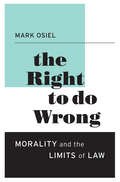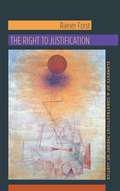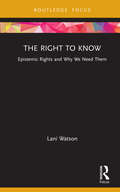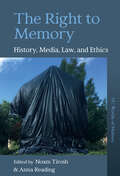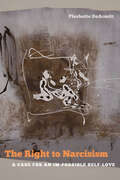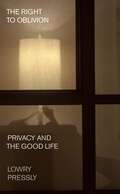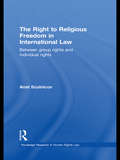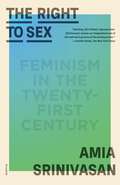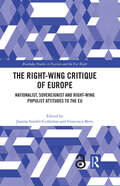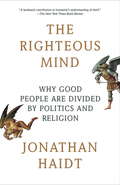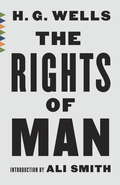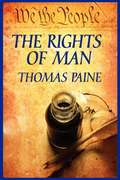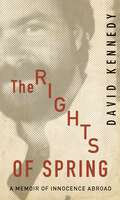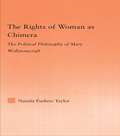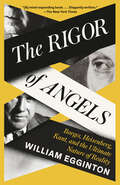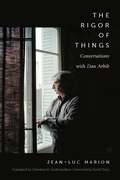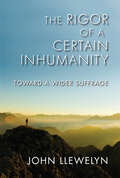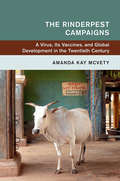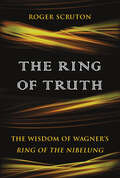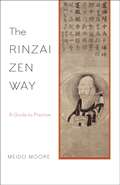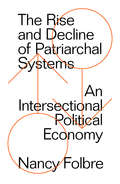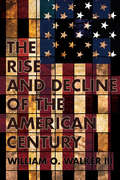- Table View
- List View
The Right to Do Wrong: Morality and the Limits of Law
by Mark OsielMuch of what we could do, we shouldn’t—and we don’t. Mark Osiel shows that common morality—expressed as shame, outrage, and stigma—is society’s first line of defense against transgressions. Social norms can be indefensible, but when they complement the law, they can save us from an alternative that is far worse: a repressive legal regime.
The Right to Health Care: Ethical Considerations (The International Library of Bioethics #92)
by Eike-Henner W. KlugeThis book provides an in-depth ethical analysis of the right to health care by contrasting privatized with socialized approaches. It pays special attention to how a socialized approach can be implemented in the context of limited resources and offers a way of integrating allocation decisions at the policy level with institutional and hands-on decision-making. It also discusses how the right to health care translates into duties on part of the members of society. In an Appendix, it suggests how, in time of need, the TRIPS Agreement allows countries to side-step patent regulations that would otherwise raise the cost of patented healthcare products beyond what a particular society is able to afford. The book is of interest not only to scholars but also to healthcare policy makers, administrators and healthcare professionals, as well as to patients themselves.
The Right to Justification: Elements of a Constructivist Theory of Justice (New Directions in Critical Theory #46)
by Rainer ForstContemporary philosophical pluralism recognizes the inevitability and legitimacy of multiple ethical perspectives and values, making it difficult to isolate the higher-order principles on which to base a theory of justice. Rising up to meet this challenge, Rainer Forst, a leading member of the Frankfurt School's newest generation of philosophers, conceives of an "autonomous" construction of justice founded on what he calls the basic moral right to justification.Forst begins by identifying this right from the perspective of moral philosophy. Then, through an innovative, detailed critical analysis, he ties together the central components of social and political justice-freedom, democracy, equality, and toleration-and joins them to the right to justification. The resulting theory treats "justificatory power" as the central question of justice, and by adopting this approach, Forst argues, we can discursively work out, or "construct," principles of justice, especially with respect to transnational justice and human rights issues. As he builds his theory, Forst engages with the work of Anglo-American philosophers such as John Rawls, Ronald Dworkin, and Amartya Sen, and critical theorists such as Jürgen Habermas, Nancy Fraser, and Axel Honneth. Straddling multiple subjects, from politics and law to social protest and philosophical conceptions of practical reason, Forst brilliantly gathers contesting claims around a single, elastic theory of justice.
The Right to Know: Epistemic Rights and Why We Need Them (Routledge Focus on Philosophy)
by Lani WatsonWe speak of the right to know with relative ease. You have the right to know the results of a medical test or to be informed about the collection and use of personal data. But what exactly is the right to know, and who should we trust to safeguard it? This book provides the first comprehensive examination of the right to know and other epistemic rights: rights to goods such as information, knowledge and truth. These rights play a prominent role in our information-centric society and yet they often go unnoticed, disregarded and unprotected. As such, those who control what we know, or think we know, exert an influence on our lives that is often as dangerous as it is imperceptible. Beginning with a rigorous but accessible philosophical account of epistemic rights, Lani Watson examines the harms caused by epistemic rights violations, drawing on case studies across medical, political and legal contexts. She investigates who has the right to what information, who is responsible for the quality and circulation of information and what epistemic duties we have towards each other. This book is essential reading for philosophers, legal theorists and anyone concerned with the protection and promotion of information, knowledge and truth. .
The Right to Memory: History, Media, Law, and Ethics (Worlds of Memory #10)
by Noam Tirosh and Anna ReadingThe field of memory studies has typically focused on everyday memory and commemoration practices through which we construct meaning and identities. The Right to Memory looks beyond these everyday practices, focusing instead on how memory relates to human rights and socio-legal constructs in order to legitimize and protect groups and individuals. With case studies including Polish Holocaust Law, the Indian origins of Amartya Sen’s capability theory approach, and the right to memory through digital technologies in Brazilian and British museums, this collected volume seeks to establish the right to memory as a foundational topic in memory studies.
The Right to Narcissism: A Case for an Im-possible Self-love
by Pleshette DeArmittThis book aims to wrest the concept of narcissism from its common and pejorative meanings— egoism and vanity—by revealing its complexity and importance. DeArmitt undertakes the work of rehabilitating “narcissism” by patiently reexamining the terms and figures that have been associated with it, especially in the writings of Rousseau, Kristeva, and Derrida.These thinkers are known for incisively exposing a certain (traditional) narcissism that has been operative in Western thought and culture and for revealing the violence it has wrought— from the dangers of amour-propre and the pathology of a collective “one’s own” to the phantasm of the sovereign One. Nonetheless, each of these thinkers denounces the naive denunciation of “narcissism,” as the dangers of a non-negotiation with narcissism are more perilous. By rethinking “narcissism” as a complex structure of self-relation through the Other, the book reveals the necessity of an im-possible self-love.
The Right to Oblivion: Privacy and the Good Life
by Lowry PresslyA visionary reexamination of the value of privacy in today’s hypermediated world—not just as a political right but as the key to a life worth living.The parts of our lives that are not being surveilled and turned into data diminish each day. We are able to configure privacy settings on our devices and social media platforms, but we know our efforts pale in comparison to the scale of surveillance capitalism and algorithmic manipulation. In our hyperconnected era, many have begun to wonder whether it is still possible to live a private life, or whether it is no longer worth fighting for.The Right to Oblivion argues incisively and persuasively that we still can and should strive for privacy, though for different reasons than we might think. Recent years have seen heated debate in the realm of law and technology about why privacy matters, often focusing on how personal data breaches amount to violations of individual freedom. Yet as Lowry Pressly shows, the very terms of this debate have undermined our understanding of privacy’s real value. In a novel philosophical account, Pressly insists that privacy isn’t simply a right to be protected but a tool for making life meaningful.Privacy deepens our relationships with others as well as ourselves, reinforcing our capacities for agency, trust, play, self-discovery, and growth. Without privacy, the world would grow shallow, lonely, and inhospitable. Drawing inspiration from the likes of Hannah Arendt, Jorge Luis Borges, and a range of contemporary artists, Pressly shows why we all need a refuge from the world: not a place to hide, but a psychic space beyond the confines of a digital world in which the individual is treated as mere data.
The Right to Religious Freedom in International Law: Between Group Rights and Individual Rights (Routledge Research In Human Rights Law Ser. #2)
by Anat ScolnicovThis book analyses the right to religious freedom in international law, drawing on an array of national and international cases. Taking a rigorous approach to the right to religious freedom, Anat Scolnicov argues that the interpretation and application of religious freedom must be understood as a conflict between individual and group claims of rights, and that although some states, based on their respective histories, religions, and cultures, protect the group over the individual, only an individualistic approach of international law is a coherent way of protecting religious freedom. Analysing legal structures in a variety of both Western and Non-Western jurisdictions, the book sets out a topography of different constitutional structures of religions within states and evaluates their compliance with international human rights law. The book also considers the position of women's religious freedom vis-à-vis community claims of religious freedom, of children’s right to religious freedom and of the rights of dissenters within religious groups.
The Right to Sex: Feminism in the Twenty-First Century
by Amia Srinivasan“Laser-cut writing and a stunning intellect. If only every writer made this much beautiful sense.”—Lisa Taddeo, author of Three Women“Amia Srinivasan is an unparalleled and extraordinary writer—no one X-rays an argument, a desire, a contradiction, a defense mechanism quite like her. In stripping the new politics of sex and power down to its fundamental and sometimes clashing principles, The Right to Sex is a bracing revivification of a crucial lineage in feminist writing: Srinivasan is daring, compassionate, and in relentless search of a new frame.”—Jia Tolentino, author of Trick Mirror: Reflections on Self DelusionThrilling, sharp, and deeply humane, philosopher Amia Srinivasan's The Right to Sex: Feminism in the Twenty-First Century upends the way we discuss—or avoid discussing—the problems and politics of sex.How should we think about sex? It is a thing we have and also a thing we do; a supposedly private act laden with public meaning; a personal preference shaped by outside forces; a place where pleasure and ethics can pull wildly apart.How should we talk about sex? Since #MeToo many have fixed on consent as the key framework for achieving sexual justice. Yet consent is a blunt tool. To grasp sex in all its complexity—its deep ambivalences, its relationship to gender, class, race and power—we need to move beyond yes and no, wanted and unwanted.We do not know the future of sex—but perhaps we could imagine it. Amia Srinivasan’s stunning debut helps us do just that. She traces the meaning of sex in our world, animated by the hope of a different world. She reaches back into an older feminist tradition that was unafraid to think of sex as a political phenomenon. She discusses a range of fraught relationships—between discrimination and preference, pornography and freedom, rape and racial injustice, punishment and accountability, students and teachers, pleasure and power, capitalism and liberation.The Right to Sex: Feminism in the Twenty-First Century is a provocation and a promise, transforming many of our most urgent political debates and asking what it might mean to be free.
The Right, the Good and the Happy: The Christian in a World of Distorted Values
by Bernard L. Ramm[from inside flaps] "Why have drugs replaced beer, cigarettes, and even hamburgers in the life of the young person? What should be done about the large number of living dead--human vegetables who are kept alive through machines? Is it right to postpone the inevitable? Why should any woman in the twentieth century want or need an abortion? Should there never be abortion? Should there be abortion on request? Does the implantation of an organ from the body of one person to another create a crisis of identity in the person who has the transplant? * When is a person actually dead? * Who should receive the transplant--an unknown or a prominent community personality? Does the individual have the right to decide if a war is just or not and have his decision honored by the government? Can atomic war ever be considered a just war? In the technological age a man may live two hundred years. If there is work enough to last him only to age thirty, what is he supposed to do for the next 170 years? All of these situations demand ethical decisions. Should the Christian's choice, in any of these matters, be more realistic or more compassionate than that of any other person? Dr. Bernard L. Ramm points out that if Christianity is a total way of life--and he believes that this is what the Bible teaches--then the ethical and moral character of the Christian's life must reflect the love, justice, and equity of God whom he worships. The Right, the Good and the Happy is a practical book. After dealing briefly with general ethical theory, the author concentrates on specific moral and ethical issues. But this is not a guide to easy ethical decisionmaking. Dr. Ramm presents arguments for and against a given position. Occasionally he takes sides; often he lets the reader draw his own conclusions. Traditionally, there has been a strong emphasis in the church that if a person has accepted Christ, he will almost always make right choices. But an automatic change of heart in human relations or politics or economics does not necessarily occur just because a person is converted. What should the church's message be as it seeks to lead and train Christians toward a mature ethical perspective? Dr. Ramm says that there can be only one approach if the followers of Christ are to be enriched through growth into the right, the good, and the happy life. "The church ought to follow ethical policies that are redemptive, that are healing, and that offer hope for happiness in the future.""
The Right-Wing Critique of Europe: Nationalist, Sovereignist and Right-Wing Populist Attitudes to the EU (Routledge Studies in Fascism and the Far Right)
by Joanna Sondel-CedarmasThe Right-Wing Critique of Europe analyses the opposition to the European Union from a variety of right-wing organisations in Western, Central and Eastern Europe. In recent years, opposition to the processes of globalisation and the programme of closer European integration, understood as a threat to the sovereignty of individual member states, has led to an intensification of Eurosceptic sentiments on the Old Continent. The results of the European parliamentary elections in 2014 and 2019, the Brexit referendum and electoral results in different European countries are all testament to the considerable growth of radical populist-nationalist and conservative-sovereignist movements and parties. The common idea that binds these groups, both in Western Europe and in Central and Eastern Europe, is a hostile attitude towards the idea of (an ever-more integrated) united Europe. These parties reject not only the project of building a European federation, but also the current model of the European Union and the values underlying its attitudes. They are united by their criticism of EU policies, in particular those concerning security, emigration, multiculturalism, gender equality and the rights of minorities, as well as economic liberalism and the common currency. However, this criticism manifests itself with varying degrees of intensity, and not all parties fit the classic definition of Euroscepticism but instead represent its mild form, Eurorealism. The authors bring together reflections on the organic and complex critique of the European Union, its policies and cultural and ideological character. The book provides a comparative analysis of this criticism at the transnational level. This book will be of interest to researchers of European politics, the radical right and Euroscepticism.
The Righteous Mind: Why Good People Are Divided by Politics and Religion
by Jonathan HaidtWhy can't our political leaders work together as threats loom and problems mount? Why do people so readily assume the worst about the motives of their fellow citizens? In The Righteous Mind, social psychologist Jonathan Haidt explores the origins of our divisions and points the way forward to mutual understanding. His starting point is moral intuition--the nearly instantaneous perceptions we all have about other people and the things they do. These intuitions feel like self-evident truths, making us righteously certain that those who see things differently are wrong. Haidt shows us how these intuitions differ across cultures, including the cultures of the political left and right. He blends his own research findings with those of anthropologists, historians, and other psychologists to draw a map of the moral domain, and he explains why conservatives can navigate that map more skillfully than can liberals. He then examines the origins of morality, overturning the view that evolution made us fundamentally selfish creatures. But rather than arguing that we are innately altruistic, he makes a more subtle claim--that we are fundamentally groupish. It is our groupishness, he explains, that leads to our greatest joys, our religious divisions, and our political affiliations. In a stunning final chapter on ideology and civility, Haidt shows what each side is right about, and why we need the insights of liberals, conservatives, and libertarians to flourish as a nation.
The Rights of Man
by H. G. WellsH. G. Wells’s passionate and influential manifesto—never before available in the United States—was first published in England in 1940 in response to World War II. The progressive ideas Wells set out were instrumental in the creation of the UN’s Universal Declaration of Human Rights, the European Convention on Human Rights, and the UK’s Human Rights Act. In the face of a global miscarriage of justice, The Rights of Man made a clear statement of mankind’s responsibilities to itself. Seventy-five years later we are again witnessing a humanitarian crisis, with human rights in developed nations under threat and millions of refugees displaced. A new introduction to Wells’s work by award-winning novelist Ali Smith underlines the continuing urgency and relevance of one of the most important humanitarian texts of the twentieth century.
The Rights of Man
by Thomas PaineIn The Rights of Man, Thomas Paine defends the representational form of government. He posits that all men are born with God-given rights that cannot be taken from them by any government. Paine's position on inalienable rights played a major role in the Bill of Rights being included in the Constitution. This seminal work is as pertinent today as when it was first written.
The Rights of Spring: A Memoir of Innocence Abroad
by David KennedyAna reported being blindfolded, doused in cold water. She was tied to a metal frame; electrodes were fastened to her body. Someone cranked a hand-operated generator. One spring more than twenty years ago, David Kennedy visited Ana in an Uruguayan prison as part of the first wave of humanitarian activists to take the fight for human rights to the very sites where atrocities were committed. Kennedy was eager to learn what human rights workers could do, idealistic about changing the world and helping people like Ana. But he also had doubts. What could activists really change? Was there something unseemly about humanitarians from wealthy countries flitting into dictatorships, presenting themselves as white knights, and taking in the tourist sites before flying home? Kennedy wrote up a memoir of his hopes and doubts on that trip to Uruguay and combines it here with reflections on what has happened to the world of international humanitarianism since. Now bureaucratized, naming and shaming from a great height in big-city office towers, human rights workers have achieved positions of formidable power. They have done much good. But the moral ambiguity of their work and questions about whether they can sometimes cause real harm endure. Kennedy tackles those questions here with his trademark combination of narrative drive and unflinching honesty. This is a powerful and disturbing tale of the bright sides and the dark sides of the humanitarian world built by good intentions.
The Rights of Woman as Chimera: The Political Philosophy of Mary Wollstonecraft (Studies In Philosophy Ser.)
by Natalie TaylorThe Rights of Woman as Chimera examines Mary Wollstonecraft's intellectual relationship to Rousseau, Locke, and Aristotle. Although she learned much from each philosopher, her own thought cannot be said to be simply derivative of these thinkers. In considering "the woman question," Wollstonecraft levels important, but friendly, critiques of her male predecessors. She puts forth a conception of the nature of woman, which is informed by and consistent with her larger political philosophy, and this study endeavors to outline this conception of the nature of woman.
The Rigor of Angels: Borges, Heisenberg, Kant, and the Ultimate Nature of Reality
by William EggintonA NEW YORK TIMES AND NEW YORKER BEST BOOK OF THE YEAR • A poet, a physicist, and a philosopher explored the greatest enigmas in the universe—the nature of free will, the strange fabric of the cosmos, the true limits of the mind—and each in their own way uncovered a revelatory truth about our place in the world&“[A] mind-expanding book. . . . Elegantly written.&” —The New York Times&“A remarkable synthesis of the thoughts, ideas, and discoveries of three of the greatest minds that our species has produced.&” —John Banville, The Wall Street JournalArgentine poet Jorge Luis Borges was madly in love when his life was shattered by painful heartbreak. But the breakdown that followed illuminated an incontrovertible truth—that love is necessarily imbued with loss, that the one doesn&’t exist without the other. German physicist Werner Heisenberg was fighting with the scientific establishment on the meaning of the quantum realm&’s absurdity when he had his own epiphany—that there is no such thing as a complete, perfect description of reality. Prussian philosopher Immanuel Kant pushed the assumptions of human reason to their mind-bending conclusions, but emerged with an idea that crowned a towering philosophical system—that the human mind has fundamental limits, and those limits undergird both our greatest achievements as well as our missteps.Through fiction, science, and philosophy, the work of these three thinkers coalesced around the powerful, haunting fact that there is an irreconcilable difference between reality &“out there&” and reality as we experience it. Out of this profound truth comes a multitude of galvanizing ideas: the notion of selfhood, free will, and purpose in human life; the roots of morality, aesthetics, and reason; and the origins and nature of the cosmos itself. As each of these thinkers shows, every one of us has an incomplete picture of the world. But it's only as mortal, finite beings are we able to experience the world in its richness and breathtaking majesty. A soaring and lucid reflection on the lives and work of Borges, Heisenberg, and Kant, The Rigor of Angels movingly demonstrates that the mysteries of our place in the world may always loom over us—not as a threat, but as a reminder of our humble humanity.
The Rigor of Things: Conversations with Dan Arbib
by Jean-Luc Marion Dan ArbibIn a series of conversations, Jean-Luc Marion reconstructs a career’s path in the history of philosophy, theology, and phenomenology. Discussing such concepts as the event, the gift, and the saturated phenomenon, Marion elaborates the rigor displayed by the things themselves. He discusses the major stages of his work and offers his views on the forces that have driven his thought.The conversation ranges from Marion’s engagement with Descartes, to phenomenology and theology, to Marion’s intellectual and biographical backgrounds, concluding with illuminating insights on the state of the Catholic Church today and on Judeo-Christian dialogue. Marion also reflects on the relationship of philosophy to history, theology, aesthetics, and literature. At the same time, the book provides an account of French intellectual life in the late twentieth century. In these interviews, Marion’s language is more conversational than in his formal writing, but it remains serious and substantive. The book serves as an excellent and comprehensive introduction to Marion’s thought and work.
The Rigor of a Certain Inhumanity: Toward A Wider Suffrage (Studies In Continental Thought Ser.)
by John LlewelynFocusing on the idea of universal suffrage, John Llewelyn accepts the challenge of Derrida's later thought to renew his focus on the ethical, political, and religious dimensions of what makes us uniquely human. Llewelyn builds this concern on issues of representation, language, meaning, and logic with reflections on the phenomenological figures who informed Derrida's concept of deconstruction. By entering into dialogue with these philosophical traditions, Llewelyn demonstrates the range and depth of his own original thinking. The Rigor of a Certain Inhumanity is a rich and passionate, playful and perceptive work of philosophical analysis.
The Rinderpest Campaigns: A Virus, Its Vaccines, and Global Development in the Twentieth Century (Global and International History)
by Amanda Kay McVetyAmanda Kay McVety has written the first history of the international effort to eradicate rinderpest - a devastating cattle disease - which began in the 1940s and ended in 2011. Rinderpest is the only other disease besides smallpox to have been eradicated, but very few people in the United States know about it, because it did not infect humans and never broke out in North America. In other parts of the world, however, rinderpest was a serious economic and social burden and the struggle against it was a critical part of the effort to fight poverty and hunger globally. McVety follows the deployment of rinderpest vaccines around the globe, exploring the role of the environment in the understanding of development, internationalism, and national security. She expands the standard Cold War narratives to show how these concepts were framed not only by economic and political concerns, but also by biological ones.
The Ring of Truth: The Wisdom of Wagner's Ring of the Nibelung
by Roger ScrutonThe vital, carefully crafted discussion on Wagner’s masterpiece, offering deep insight into both the work itself and profound perspective on certain key philosophical questions Richard Wagner’s Ring of the Nibelung is one of the greatest works of art created in modern times, and has fascinated both critics and devotees for over a century and a half. No recent study has examined the meaning of Wagner's masterpiece with the attention to detail and intellectual power that Roger Scruton brings to it in this inspiring account. The Ring of Truth is an exploration of the drama, music, symbolism and philosophy of the Ring from a writer whose knowledge and understanding of the Western musical tradition are the equal of his capacities as a philosopher. Scruton shows how, through musical connections and brilliant dramatic strokes, Wagner is able to express truths about the human condition which few other creative artists have been able to convey so convincingly. For Wagner, writes Scruton, the task of art is to “show us freedom in its immediate, contingent, human form, reminding us of what it means to us. Even if we live in a world from which gods and heroes have disappeared we can, by imagining them, dramatize the deep truths of our condition and renew our faith in what we are.” Love, death, sacrifice and the liberation that we win through sacrifice—these are the great themes of the Ring, as they are of this book. Scruton's passionate and moving interpretation allows us to understand more fully than ever how Wagner conveys his ideas about who we are, and why the Ring continues to be such a hypnotically absorbing work.
The Rinzai Zen Way: A Guide To Practice
by Meido MooreThe first accessible beginner's guide to Rinzai Zen practice.The recognition of the true nature of oneself and the universe is the aim of Rinzai Zen—but that experience, known as kensho, is really just the beginning of a life of refining that discovery and putting it into practice in the world. Rinzai, with its famed discipline and its emphasis on koan practice, is one of two main forms of Zen practiced in the West, but it is less familiar than the more prominent Soto school. Meido Moore here remedies that situation by providing this compact and complete introduction to Zen philosophy and practice from the Rinzai perspective. It’s an excellent entrée to a venerable tradition that goes back through the renowned Hakuin Ekaku in eighteenth-century Japan to its origins in Tang dynasty China—and that offers a path to living with insight and compassion for people today.
The Rise and Decline of Patriarchal Systems
by Nancy FolbreA major new work of feminism on the history and persistence of patriarchal hierarchies from the MacArthur Award-winning economistIn this groundbreaking new work, Nancy Folbre builds on a critique and reformulation of Marxian political economy, drawing on a larger body of scientific research, including neoclassical economics, sociology, psychology, and evolutionary biology, to answer the defining question of feminist political economy: why is gender inequality so pervasive? In part, because of the contradictory effects of capitalist development: on the one hand, rapid technological change has improved living standards and increased the scope for individual choice for women; on the other, increased inequality and the weakening of families and communities have reconfigured gender inequalities, leaving caregivers particularly vulnerable.The Rise and Decline of Patriarchal Systems examines why care work is generally unrewarded in a market economy, calling attention to the non-market processes of childbearing, childrearing and the care of other dependents, the inheritance of assets, and the use of force and violence to appropriate both physical and human resources. Exploring intersecting inequalities based on class, gender, age, race/ethnicity, and citizenship, and their implications for political coalitions, it sets a new feminist agenda for the twenty-first century.
The Rise and Decline of the American Century
by William O. Walker IIIIn 1941 the magazine publishing titan Henry R. Luce urged the nation’s leaders to create an American Century. But in the post-World-War-II era proponents of the American Century faced a daunting task. Even so, Luce had articulated an animating idea that, as William O. Walker III skillfully shows in The Rise and Decline of the American Century, would guide United States foreign policy through the years of hot and cold war.The American Century was, Walker argues, the counter-balance to defensive war during World War II and the containment of communism during the Cold War. American policymakers pursued an aggressive agenda to extend U.S. influence around the globe through control of economic markets, reliance on nation-building, and, where necessary, provision of arms to allied forces. This positive program for the expansion of American power, Walker deftly demonstrates, came in for widespread criticism by the late 1950s. A changing world, epitomized by the nonaligned movement, challenged U.S. leadership and denigrated the market democracy at the heart of the ideal of the American Century.Walker analyzes the international crises and monetary troubles that further curtailed the reach of the American Century in the early 1960s and brought it to a halt by the end of that decade. By 1968, it seemed that all the United States had to offer to allies and non-hostile nations was convenient military might, nuclear deterrence, and the uncertainty of détente. Once the dust had fallen on Lyndon B. Johnson’s presidency and Richard M. Nixon had taken office, what remained was, The Rise and Decline of the American Century shows, an adulterated, strategically-based version of Luce’s American Century.
The Rise and Fall of Arab Presidents for Life
by Roger OwenThe monarchical presidential regimes that prevailed in the Arab world for so long looked as though they would last indefinitely-until events in Tunisia and Egypt made clear their time was up. The Rise and Fall of Arab Presidents for Life exposes for the first time the origins and dynamics of a governmental system that largely defined the Arab Middle East in the twentieth century. Presidents who rule for life have been a feature of the Arab world since independence. In the 1980s their regimes increasingly resembled monarchies as presidents took up residence in palaces and made every effort to ensure their sons would succeed them. Roger Owen explores the main features of the prototypical Arab monarchical regime: its household; its inner circle of corrupt cronies; and its attempts to create a popular legitimacy based on economic success, a manipulated constitution, managed elections, and information suppression. Why has the Arab world suffered such a concentration of permanent presidential government? Though post-Soviet Central Asia has also known monarchical presidencies, Owen argues that a significant reason is the “Arab demonstration effect,” whereby close ties across the Arab world have enabled ruling families to share management strategies and assistance. But this effect also explains why these presidencies all came under the same pressure to reform or go. Owen discusses the huge popular opposition the presidential systems engendered during the Arab Spring, and the political change that ensued, while also delineating the challenges the Arab revolutions face across the Middle East and North Africa.
